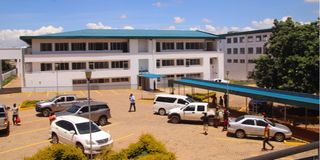County to pump Sh100m more into referral hospital, says Governor George Natembeya

Trans Nzoia Governor George Natembeya with health officials during a tour of the new County referral hospital. Mr Natembeya says his government will pump additional Sh100 million to operationalize the multi-billion 400-bed capacity County Teaching and Referral Hospital that has remained incomplete for the last 10 years.
What you need to know:
- Mr Natembeya said they cannot abandon this project after sinking a lot of public funds into it.
- He said the administration of his predecessor Patrick Khaemba spent Sh185 million to purchase the four-acre piece of land where the hospital sits.
- When completed, the hospital will have 10 operating theatres, 40 Intensive Care Unit (ICU) beds, MRI and diagnostic equipment, a modern lab, an accident and emergency section, two linear accelerators for radiotherapy services, 15 renal beds, a five-bed burn unit and a catheter lab.
The Trans Nzoia County government will pump an additional Sh100 million into the multibillion-shilling County Teaching and Referral Hospital that is still incomplete 10 years after construction started.
The 400-bed facility was hit by cash shortages, lawsuits and claims of wastage of public resources, with residents demanding that the Sh1.6 billion project be re-evaluated.
Governor George Natembeya said on Saturday the hospital will be completed as part of efforts to improve access to quality and affordable services.
“We cannot abandon this project after sinking a lot of public funds into it. What is now required is about Sh100 to make it operational,” he said.
When completed, it will have 10 operating theatres, 40 Intensive Care Unit (ICU) beds, MRI and diagnostic equipment, a modern lab, an accident and emergency section, two linear accelerators for radiotherapy services, 15 renal beds, a five-bed burn unit, a catheter lab and others.
Total spent
Governor Natembeya said the administration of his predecessor Patrick Khaemba spent Sh185 million to purchase the four-acre piece of land where the hospital sits on the outskirts of Kitale.
He warned against theft of drugs in public hospitals, noting that stern disciplinary action will be taken against those involved in the graft.
"We are going to install a system that will monitor the procurement and dispensation of drugs and equipment," the governor said, adding that he will complete stalled health projects inherited from Mr Khaemba’s administration, including Tom Mboya Mother and Child Hospital.
He said his administration has signed a contract with the Kenya Medical Supplies Authority (Kemsa) for the supply of drugs and other medical equipment.
“We will enter into contracts with Kemsa and other medical and equipment suppliers to provide pharmaceutical and non-pharmaceutical supplies on a post-pay system,” he said.
“We have a challenge with a hefty pending bill with Kemsa, but we have engaged them on a comfortable payment plan and we expect resumption of medical supplies soon.”

Trans Nzoia Governor Natembeta accompanied by county officials touring the multi-billion County Teaching and Referral Hospital. The 400 bed capacity state of the art facility remains incomplete due to cash flow challenges, several legal suits and claims of wastage of public resources.
Health centres
He also said other health centres in Trans Nzoia’s five sub-counties will be equipped and supplied with enough drugs and personnel.
"We will add more staff who will be paid very well, but they must render services to the people," he said.
Mr Khaemba had invited the Ethics and Anti-Corruption Commission (EACC), Directorate of Criminal Investigations (DCI), Directorate of Public Prosecution(DPP) and Auditor-General to carry out a forensic audit of the county referral hospital to determine whether there were any malpractices.
“There have been allegations of malpractices and wastage of public funds in this project,” Mr Khaemba said when he released a progress report on the proposed hospital before leaving office after serving two terms.
“We are happy to have other agencies including the EACC, DPP, Auditor-General to take a deep look into this project and recommend further action if malpractices are found.”
Former governor
The former governor had promised to complete the project during his two terms in office, but that did not happen.
Before he left office, he revealed that Sh1.1 billion had been paid to over 10 contractors for various aspects of the project.
He said the project, which is being implemented in two phases, had cost the devolved unit about Sh1.42 billion.
“We pumped an estimated Sh688 million into the first phase and an additional Sh733 in phase two, with about Sh608 million going to non-medical equipment,” Mr Khaemba explained.
Some Sh2 billion was required for medical equipment and other needs before the hospital could become fully operational.
“The project has experienced a cumulative delay of two years due to cash-flow challenges and several legal suits,” Mr Khaemba said, noting that it would require an additional Sh500 million as starting capital for 1,000 medical and non-medical personnel.
He said the project was being implemented by consultants from Kenya, Dubai and Sweden and was benchmarked on the Joint Commission International Standards.





